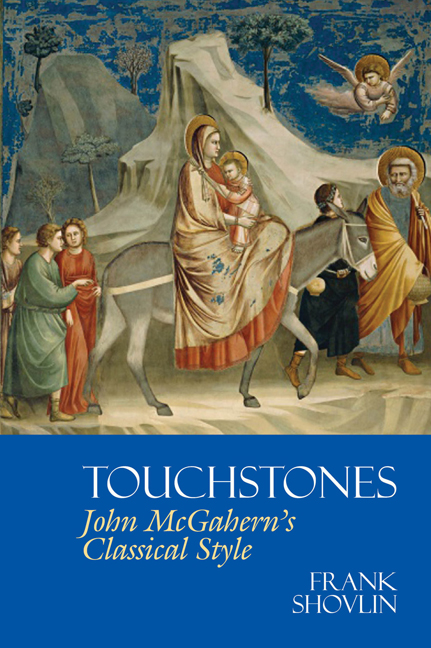Book contents
- Frontmatter
- Dedication
- Epigraph
- Contents
- Acknowledgements
- Touching Stones: Matthew Arnold and the Canon
- 1 We Other Clerks: James Joyce and the Classical Temper
- 2 A Walking Mirror: Stendhal, Horace, Nietzsche
- 3 One Lone Paperback: Tolstoy and Religious Sensibility
- 4 Magic: The Centrality of W. B. Yeats
- 5 Instinct: Douglas Stewart and Sex
- 6 The Fume of Muscatel: Yeats's Ghosts
- 7 Bohemian Rhapsody: Patrick Kavanagh and Generation X
- 8 Absurdity: Camus Comes to Clones
- 9 Aristocracy: Andrew Marvell, W. B. Yeats and the Curse of Cromwell
- 10 The Consolations of Nothingness: William Blake, W. B. Yeats and Prayer
- 11 Deliberate Happiness: W. B. Yeats and the Inner Life
- 12 Stranger in Paradise: Dante and Epic Style
- Conclusion: What Then?
- Bibliography
- Index
4 - Magic: The Centrality of W. B. Yeats
from Touching Stones: Matthew Arnold and the Canon
- Frontmatter
- Dedication
- Epigraph
- Contents
- Acknowledgements
- Touching Stones: Matthew Arnold and the Canon
- 1 We Other Clerks: James Joyce and the Classical Temper
- 2 A Walking Mirror: Stendhal, Horace, Nietzsche
- 3 One Lone Paperback: Tolstoy and Religious Sensibility
- 4 Magic: The Centrality of W. B. Yeats
- 5 Instinct: Douglas Stewart and Sex
- 6 The Fume of Muscatel: Yeats's Ghosts
- 7 Bohemian Rhapsody: Patrick Kavanagh and Generation X
- 8 Absurdity: Camus Comes to Clones
- 9 Aristocracy: Andrew Marvell, W. B. Yeats and the Curse of Cromwell
- 10 The Consolations of Nothingness: William Blake, W. B. Yeats and Prayer
- 11 Deliberate Happiness: W. B. Yeats and the Inner Life
- 12 Stranger in Paradise: Dante and Epic Style
- Conclusion: What Then?
- Bibliography
- Index
Summary
When staying with Hyde in Roscommon, I had driven over to Lough Kay, hoping to find some local memory of the old story of Tumaus Costello, which I was turning into a story now called ‘Proud Costello, Macdermot's Daughter, and the Bitter Tongue’.
W. B. Y eats, ‘Hodos Chameliontos’Thinking of the censorious and anti-intellectual Ireland in which he grew up, McGahern recalls the very profound impression left on him by the realization that he had at least one Irish literary forebear who had risen above it all and reigned, however briefly, over the empire of the imagination:
The more we read of other literatures, and the more they were discussed, the more clearly it emerged that not only was Yeats a very great poet but that almost singlehandedly he had, amazingly, laid down a whole framework in which an indigenous literature could establish traditions and grow.
‘Yeats’, he puts it more informally in some scribbled notes on his favourite of the Sligo writer's plays, Purgatory, ‘always instinctively knew what he was at’. This is classic McGahern locution: understated, admiring and accurate all at the same time, and it sums up his unmatched reverence for Ireland's greatest poet. McGahern read voraciously across all of Yeats's work. Unlike some critics, he took Yeats's plays seriously, and though Purgatory remained the one with most hold over him, he read them all and, I will argue in later chapters, used at least two lesser known dramatic works, Where There is Nothing and The Land of Heart's Desire, as inspiration for his fiction. Yeats's poetry is never far from McGahern's mind. Even Yeats's more obtuse, esoteric work plays its part in forming McGahern's aesthetic practice – A Vision, McGahern writes, is a ‘rag bag but useful’. When trying to define what constitutes ‘great’ writing McGahern allows himself to use a word that held no fear for Yeats but from which most writers, and nearly all critics, shy away: ‘all great writing has a spiritual quality that we can recognize but never quite define. […] Call it moral fragrance or style or that older, healing word – magic’.
- Type
- Chapter
- Information
- Touchstones: John McGahern’s Classical Style , pp. 58 - 75Publisher: Liverpool University PressPrint publication year: 2016

